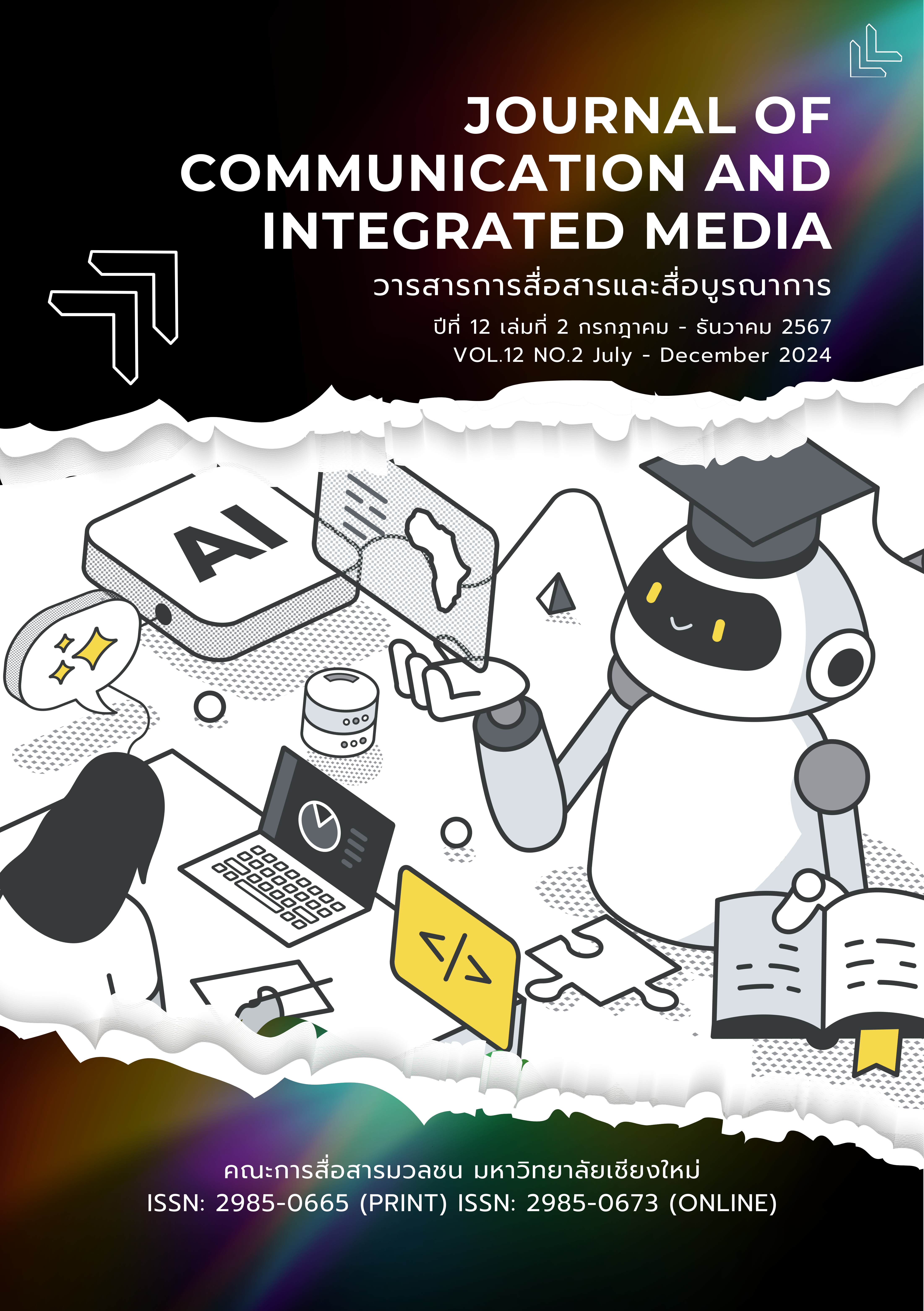Representation of Girl Group BNK48 on Social Media
Main Article Content
Abstract
The thesis titled “Representation of Girl Group BNK48 on Social Media” aims to investigate how the girl group BNK48 is represented on social media. Using qualitative research methodology, specifically textual analysis, this study employs purposive sampling to collect relevant data. The data encompassed various categories, including 1) news about awards or nominations, 2) Single Senbatsu General Election, 3) news concerning graduation announcements, and 4) controversies involving the artists. Historical data from 2018 to 2022, a period during the artists are most talked about on social media was collected from the official fan page on Facebook (https://www.facebook.com/bnk 48official).
The research results found that BNK48 represents women who are typical of Japanese-Thai idols. In the case of news about receiving award, hilights the group member as a well-behaved youth and being a role model accepted by the general public and society. Becoming a member of BNK48 involves being a role. During model in Thai society.This encourage fans to follow and support them, leading to the artists be recognized as idols. Consequently, idol artists become influencers among adolescent groups and fan clubs, influencing adherence to societal norms as reflected in the representations of women deemed acceptable news about the Single Senbatsu General Election, it reflects modern women who step into competitive professional space to achieve success in the entertainment industry. Regarding news about graduation annoucements, it marks the end of women as BNK48 artists. The graduation signifies the expiration of young women, as cultural goods artists. Furthermore, controversies surrounding artists hilight the control over their self-expression in private spaces to ensure they do not exhibit characteristics or image that go against the standards set be their affiliation.
Article Details

This work is licensed under a Creative Commons Attribution-NonCommercial-NoDerivatives 4.0 International License.
ลิขสิทธ์ที่ผู้เขียนบทความต้องยอมรับ
References
กันต์ธนัน ดำดี และ อดิพล เอื้อจรัสพันธุ์. (2564). มองไอดอล (Idol) ผ่าน BNK48. วารสารนิเทศศาสตร์ธุรกิจบัณฑิตย์, 15(2), 293-321.
ขวัญฟ้า ศรีประพันธ์. (2551). ภาพตัวแทนคนจนในรายการเกมโชว์ทางโทรทัศน์[วิทยานิพนธ์ปริญญาปรัชญาดุษฎีบัณฑิต]. มหาวิทยาลัยธรรมศาสตร์.
จีญาพัชญ์ บุญราช, จิดาภา นภาพิพัฒน์, และ รภัส ศิลป์ศรีกุล. (2560). ความชื่นชอบในกระแสวัฒนธรรมร่วมสมัย ภาพลักษณ์ และความตั้งใจเชิงพฤติกรรมทางการท่องเที่ยว: การศึกษาเปรียบเทียบระหว่างชาวไทยที่ชื่นชอบกระแสวัฒนธรรมร่วมสมัยของเกาหลี (K-POP) กับชาวไทยที่ชื่นชอบกระแสวัฒนธรรมร่วมสมัยของญี่ปุ่น (J-POP). [Paper presentation], การประชุมทางวิชาการของมหาวิทยาลัยเกษตรศาสตร์ ครั้งที่ 55, กรุงเทพฯ, ประเทศไทย.
เจษฎา ศาลาทอง. (2561, 14 พฤษภาคม). ลงโทษสมาชิก BNK48 กับภาพสะท้อนธุรกิจบันเทิง. รู้ลึกกับจุฬาฯ. Chulalongkorn University. https://www.chula.ac.th/cuinside/8644/
ณัชชา ตันตระกูล. (2562). จาก AKB48 สู่ BNK48: พัฒนาการของวัฒนธรรมไอดอลในญี่ปุ่นและความนิยมในประเทศไทย [บทความวิจัยปริญญาอักษรศาสตรบัณฑิต]. มหาวิทยาลัยศิลปากร.
นลินทิพย์ เนตรวงศ์. (2559). ภาพตัวแทน “ผู้ชายในฝัน” ในละครโทรทัศน์แนวโรมานซ์ [วิทยานิพนธ์ปริญญามหาบัณฑิต]. มหาวิทยาลัยธรรมศาสตร์.
ปฏิภาณ ชูขวัญ. (2561). วัฒนธรรมแฟนของวงไอดอลญี่ปุ่นในสังคมไทย กรณีศึกษา กลุ่มโอตะวงบีเอ็นเคโฟร์ตีเอต [สารนิพนธ์ปริญญาศิลปศาสตรบัณฑิต]. มหาวิทยาลัยศิลปากร.
พันธกานต์ ทานนท์. (2559). การสื่อสารภาพตัวแทนของผู้หญิงชนบทในเพลงลูกทุ่งที่ขับร้องโดย ตั๊กแตน ชลดา [วิทยานิพนธ์ปริญญามหาบัณฑิต]. มหาวิทยาลัยธรรมศาสตร์.
พิริยะ ผลพิรุฬห์. (2561, 26 กุมภาพันธ์). เศรษฐศาสตร์ว่าด้วยเรื่องของ “BNK48”. PostToday. https://www.posttoday.com/social/think/541982
ฟ้องแม่แน่. (2563, 16 กรกฎาคม). เผยหลักฐานวงไอดอลชื่อดัง. Facebook. https://www.facebook.com/share/gyfvjjos1gBvLhvL/
ลงทุนศาสตร์. (2561, 8 มีนาคม). “ไอดอล” ต่างกับ “ดารา” อย่างไร. https://www.investerest.co/business /////////bnk48/
วรัญญา บูรณากาญจน์. (2561, 15 สิงหาคม). จาก “เด็กสาวข้างบ้าน” สู่ “ศาสดา” ของเหล่าแฟน. The101.World. https://www.the101.world/becoming-the-idol/
วารุณี ภูริสินสิทธิ์. (2545). สตรีนิยม: ขบวนการและแนวคิดทางสังคมแห่งศตวรรษที่ 20. โครงการจัดพิมพ์คบไฟ.
วิกิพีเดีย. (2566, 8 พฤศจิกายน). ไอดอลญี่ปุ่น. https://shorturl.at/kGGfG
เวฬุรีย์ เมธาวีวินิจ. (2562). ภาพตัวแทนความรักและความสัมพันธ์ของหญิงสาวในบทเพลงของกลุ่มศิลปินหญิง: จาก สาว สาว สาว ถึง BNK48. วารสารนิเทศศาสตร์ธุรกิจบัณฑิตย์, 13(1), 80-129.
อิสริยา อ้นเงิน. (2560). ภาพตัวแทนของข้าราชการในละครโทรทัศน์ [วิทยานิพนธ์ปริญญามหาบัณฑิต]. มหาวิทยาลัยธรรมศาสตร์.
All about music. (2019, October 2). เกียรตินิยมอันดับ 2! เฌอปราง BNK48 บัณฑิตป้ายเเดง แฟนคลับร่วมยินดีสุดอบอุ่น (มีคลิป). TrueID. https://music.trueid.net/th-th/detail/nBL9W39noK6p
Celeste. (2020, February 11). ไอดอลคือใคร ทำไมถึงเรียกว่าไอดอล?. https://www.facebook.com/CelesteOfficialTH/posts/131584711715225/
CEOblog.co. (2018, January 28). เปิดตำนาน AKB48 จากวงไอดอลเกิร์ลกรุ๊ป สู่โมเดลธุรกิจบันเทิงระดับโลก. https://www.ceochannels.com/akb48/
MGR Online. (2019, February 3). BNK48 นี่ต่างหาก “ไทยนิยม”. https://mgronline.com/daily/detail/9610000010806


